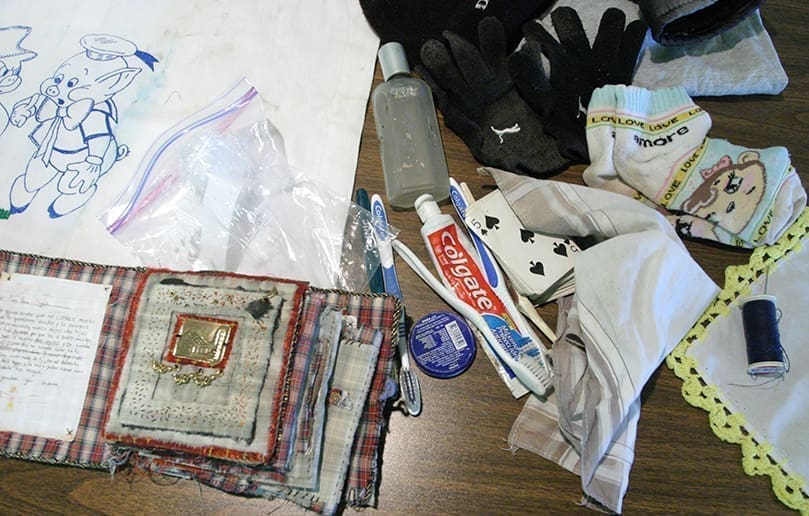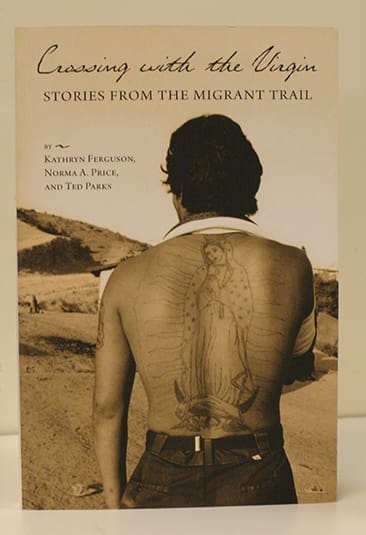 Photo By Michael Alexander
Photo By Michael AlexanderAtlanta
Book Offers Unheard Stories Of The Migrant Trail
By STEPHEN O'KANE, Staff Writer | Published September 2, 2010
It seems that most of the public immigration debate these days takes place in some political forum, making the issue about paper and laws rather than people. The authors of “Crossing With the Virgin: Stories From the Migrant Trail,” a new book published by University of Arizona Press, seek to return a human face to the issue, by sharing the stories of those attempting to reach the United States through the “migrant trail” in the Arizona desert.
Co-authored by Kathryn Ferguson, Norma A. Price, M.D., and Ted Parks, the book is a collection of 39 true stories of immigrants the authors met through their work for Samaritans, a diverse group of volunteers who focus on relieving suffering among migrant workers by providing food, water and basic medical attention. The group estimates that over 90 percent of the people they assist are heading for specific places to work.
Price, a retired Atlanta oncologist who moved to Tucson in 1998, became involved with Samaritans several years ago and recently returned to Atlanta to raise awareness of the book and the group through a Catholic Charities-sponsored event.

Norma Price talks about a new book she co-authored with two others entitled Crossing with the Virgin: Stories from the Migrant Trail. The book is a collection of 39 stories told by migrants about their perilous journey across the desert into America. Photo By Michael Alexander
“The message (of the book) is this is the human face of immigration,” said Price. “Where I live in southern Arizona is the most deadly area of migrant crossing. There are more deaths in that area than in all the other border patrol sectors combined in the United States.”
It was this rising number of deaths that motivated Price to join the Samaritan efforts.With nearly 200 dying in the Arizona desert each year, she felt, as many of the volunteers do, that something needed to be done to help these men, women and children. Price also noted that these are only the “known deaths,” and that the actual number is most likely much higher.
“The desert is such an isolated area,” she said. But “when people are hungry and can’t feed their families, they are going to come across.”
A typical group of Samaritans on patrol includes at least one medical professional, one Spanish speaker and volunteers from all walks of life. The group goes out into the desert with supplies and searches for those in trouble, in an attempt to curb the number of deaths per year.
“Over the years I have been quite taken with the work (Price) and the Samaritans have done on the border,” said Sue Colussy, director of the Immigration Legal Services program of Catholic Charities Atlanta, who introduced Price.
“It is life-saving work,” she added. “It is noteworthy that these people give up their time and use their talents to rescue people.”
In their Samaritan work, Price and other volunteers have heard both tragic and triumphant stories from the people they assist. It is these stories they felt needed to be shared with Americans in an honest, humanitarian effort to reach out to those in need.
“We said, ‘Somebody’s got to write these stories down,’” said Price, who added that none of the authors is a writer by trade.
“It is very interesting to read because their styles are very different,” said Colussy. “One is a much more analytical, journalist style and the other’s someone who is a would-be novelist, so you get a variety of takes.”
The stories tell of the various struggles of the migrant workers, from traveling with severe injuries to being robbed in the desert to the connections made between the migrants and the humanitarian groups there to offer basic help along the way.
Speaking to a roomful of people at the Catholic Center in Midtown, Price shared pictures from her work with the Samaritans and read a couple of stories from the book. She also answered questions about the Samaritans, the book and immigration in general. On a table were items found on the trail in the desert, from clothes to toys.

Crossing With the Virgin is a collection of stories told by migrants about their risky border crossing. The stories were compiled from firsthand accounts shared with volunteers for the Samaritans, a humanitarian group that attempts to prevent unnecessary deaths by providing the migrants with medical aid, water and food.
According to the Samaritan website, the group has aided hundreds of people over the last six years, some in dire medical distress. The patrol routes change as the trails continue to shift, but the volunteers usually work along State Highway 86 between Tucson and Sells and beyond to Ajo, near Ironwood Forest National Monument in the Silverbell Mine area. They also patrol State Route 286, in the Buenos Aires National Wildlife Refuge and around the Arivaca and Amado areas.
While the group has received some criticism for aiding people entering the country illegally, Price said it is never illegal to give another human being food, water or medical attention. In addition, they hope their efforts will have some effect on the immigration debate.
“We are actively seeking to change border policy by serving as witness to its failures, by drawing media attention to the suffering in the desert and by advocating a more realistic and humane border policy,” states the Samaritan website. “We support the finalization of international accords that would help prevent travelers’ deaths. We are committed to bringing all parties to the table to define sustainable immigration policy.”
For Price and the Samaritans, it is simply about helping their fellow brothers and sisters in their time of distress and suffering. And, quite often, they are recognized by those whom they are helping.
“They are always so grateful for what we have to offer and so very often shocked and surprised that someone is happy to help them,” Price said.
For information on the Samaritans or to order the book visit www.samaritanpatrol.org. The author is also scheduled to speak at the Decatur Book Festival on Sunday, Sept. 5.